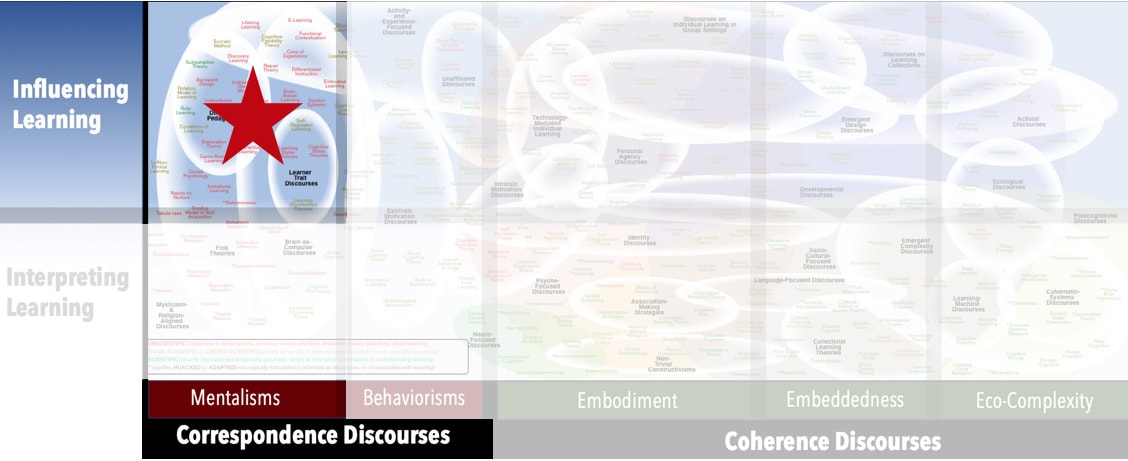Correspondence Discourses are perspectives on learning that assume a radical separation of mental (or internal, or brain-based) and physical (or external, or body-based). That separation sets up the need for a correspondence between what’s happening in the real, objective world and what’s happening in one’s inner, subjective world. Most assume object-based metaphors, linear/direct imagery, and Newtonian mechanics, thus framing learning in terms of acquiring, attaining, inputting, and/or linking.
Learn More...The Construction Metaphor frames learning in terms of individuals assembling their knowledge from bits of information received from the outside world. In its most trivial and common usage, it is a Folk Theory that is only a slight elaboration of the Acquisition Metaphor, retaining separations of inside from outside and mental from physical. More radical uses of the metaphor are encountered among Embodiment Discourses.
Learn More...Coherence Discourses regard distinctions and descriptions as useful devices to make sense of the complex dynamics of learning, but they caution that such devices are mere heuristic conveniences. Coherence Discourses suggest that truths do not exist independently or outside of a system – which is a commentary on humans’ understanding of reality, not a commentary on reality. Most Coherence Discourses employ biological and ecological metaphors, with dynamics framed in evolutionary terms.
Learn More...“Learning as acquisition” – the Acquisition Metaphor – is probably the most commonly invoked learning metaphor in English. It is evident in such phrases as “grasping the point,” “taking things in,” “getting it,” “picking things up,” “hard to swallow,” “remember this stuff,” and “cramming for the test.” It is not theoretically sophisticated, relying on the assumption that knowledge comprises externalized objects, and asserting that learning is a process of moving those objects from the outside to the inside.
Learn More...Instructivism is a generic term used in reference to teacher-directed learning contexts. Currently, the term is most often heard as a pejorative. Thus, Instructivism is typically described in terms of teacher-centered and delivery-focused lessons in which passive, undifferentiated learners are expected to master pre-specified content. It is also associated with directive modes of teaching inspired by Behaviorisms.
Learn More...Focus
Sequencing instruction for optimal learning
Principal Metaphors
Elaboration Theory is not explicitly aligned with a theory of learning, but descriptions of the theory consistently invoke the Acquisition Metaphor and the Construction Metaphor:
- Knowledge is … (assembled) object
- Knowing is … what one has put together
- Learner is … a builder (individual)
- Learning is … gathering and assembling
- Teaching is … presenting; making components available
Originated
1980s
Synopsis
Elaboration Theory is an Instructivism that offers advice on how to sequence teaching to optimize learning. Formalizing the commonsense advice to start simple, Elaboration Theory recommends that teaching sequences should first ensure that prerequisites are mastered and then proceed with a simple and personally meaningful version of the task or concept. Subsequent lessons should introduce new levels of complexity, with each iteration reminding learners of what was previously taught (summary) in a manner that enables them to pull it all together (synthesis). As they prepare, teachers should attend to motivators, analogies, cognitive strategies, and openings for learner control – all of which should be designed into the teaching sequence.
Commentary
Elaboration Theory incorporates many elements of Coherence Discourses (e.g., iterative vs. accumulative approach; embracing learner agency). However, based on the imagery and metaphors most frequently invoked in its descriptions, the theory is most strongly aligned with Correspondence Discourses. In addition, while its core assertions have the ring of common sense, they are far from readily practicable. In most cases, teachers would require extensive, nuanced understandings of the subject matter to structure lessons appropriately.
Authors and/or Prominent Influences
Charles Reigeluth
Status as a Theory of Learning
Elaboration Theory not a theory of learning.
Status as a Theory of Teaching
Elaboration Theory is a theory of teaching.
Status as a Scientific Theory
Elaboration Theory is not a scientific theory.
Map Location

Please cite this article as:
Davis, B., & Francis, K. (2019). “Elaboration Theory” in Discourses on Learning in Education. https://learningdiscourses.com.
⇦ Back to Map
⇦ Back to List

